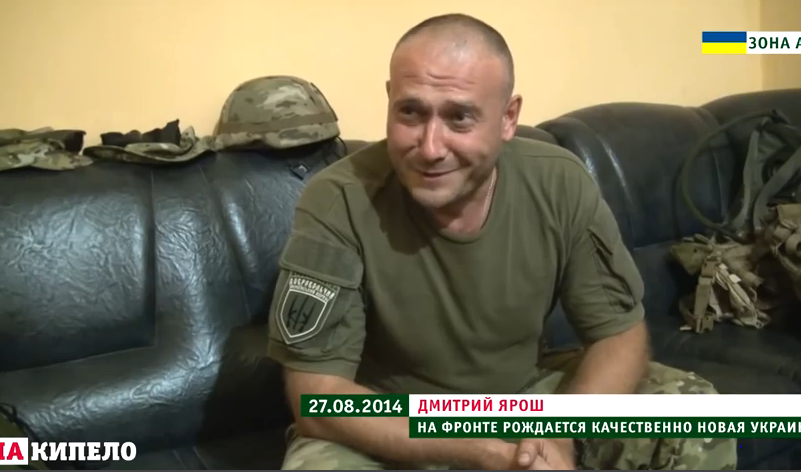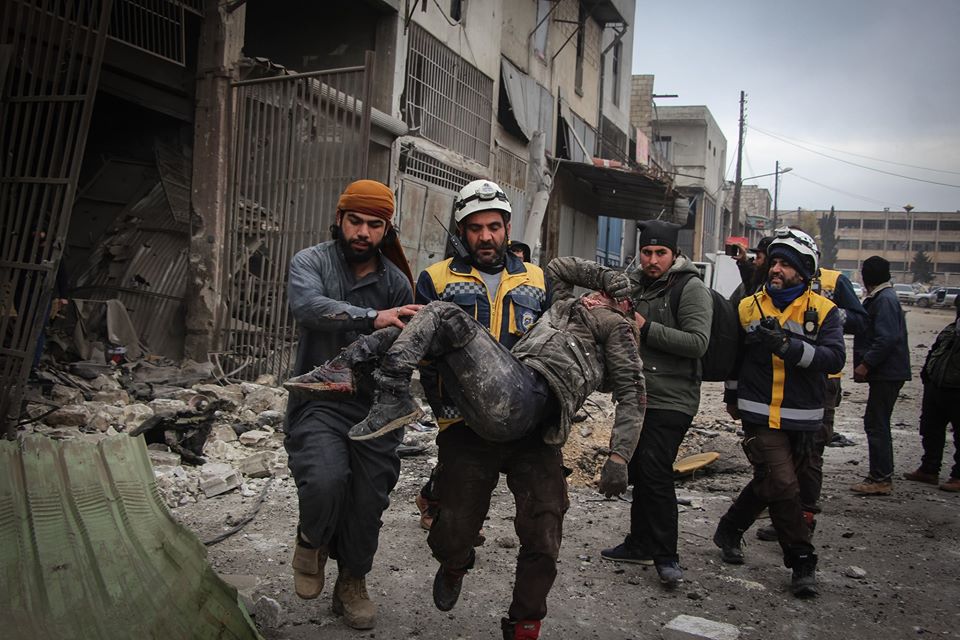At the end of August, 2014, Dmytro Yarosh gave an interview for a group of journalists:
“Through the experience of front line battles, a new Ukrainian identity is being forged,” stated Yarosh. “From this group of men a new political culture will also emerge after the war, and they will be the ones who will spearhead the (Ukrainian) revolution.” They will be the post-war core for a renaissance of Ukrainian society.
His policy is to fight on one front at a time, first Donbas, then through political reform in Kyiv, and finally to work for the return of Crimea. “There can be no compromise with the terrorists,” he said, and joked that by the time the war is over and Crimea is liberated, and perhaps even the collapse of the Putin’s Russia will follow as well, then he will be ready to retire. He hopes for such a collapse of the empire so that Ukrainians and Russians can return to being the brothers they showed themselves to be in 1991, after the Soviet Union ceased to exist.
He was asked for his assessment of President Poroshenko, to which he replied that “his success depends on him… Ukrainians have shown that they can change a situation; they can also change the president.” Yarosh indicated his surprise that as Commander in Chief, Poroshenko has not declared Ukraine to be in a state of war. “Then we would see concrete results and successes,” he explained. “Under the banner of one call to unity, ‘All efforts for the Front, everything for Victory,’” the entire country would become united.” Such as declaration would correspond to the reality on the ground. “We have ceased to be an Anti-Terrorist Operation a long time ago.”
He made a comment about the approach of Semen Semenchenko, leader of the volunteer battalion, Donbas, who is combining political activism with military involvement. “He is going about it the right way.”
Yarosh spoke of three surreal experiences of Ukraine at war: the first is leadership role shown by volunteer soldiers who have been teaching the regular army the Ukrainian fighting spirit; the second is the unnatural world of war, which is flawed as a form of justice “because it demands the shedding of human blood”; the third is “Putin’s illogical actions,” from the demand that Ukraine doesn’t and never existed, to the illusion of the Yanukovych government, because “while Yanukovych was in power, Putin was making all plans behind the scenes for Crimea and Donbas.”
A fourth surprise could be added, what Yarosh describes as the “strangely optimistic mentality of the Ukrainian nation” in spite of a shocking and brutal war. Such a positive character should have its military spirit fostered, “just like in the Kozak era,” through which Ukrainians learn what it means to be independent, to rely on themselves, and not on others, including organizations such as NATO. “We must find our own way,” he said, “because we are our own country with Europe on one side and Asia on the other.” Then he made a remark he has made in other interviews before the war started, namely that “Ukraine should be the subject of geo-politics, not a mere object.”
He was asked about the mentality of those who have been parading Ukrainian prisoners of war before the cameras. “It took ten years to get Yanukovych into power,” he answered, “by placing the right communists in position in Donbas,” so now it takes time to change the thinking of the people. “The idea of being a ‘5th column’ for Russia is changing. When we liberate villages, people now bring us lists of who the separatists are.” On a related theme, he indicated that “the young men from the east who are now hiding in the west need to do the right thing, come out, train, and for fight.”
As for the prisoners of war captured by Ukrainian armed forces, Yarosh commented that now there are fewer separatists and more regular Russian military. “They expect to be in for harsh punishment,” from what they have been told about Pravyi Sektor. “But it is not like that at all.”
Other topics discussed in the interview included prospects for the upcoming parliamentary elections, set for the autumn of 2014. “Unfortunately the timing of this election won’t result in a very great change in the composition of parliament,” he said, “because those who would make really good candidates are at war,” while those who are not fighting aren’t the best candidates. Nonetheless, Yarosh is a big proponent, even if the war means that not all regions will be able to get to the polls.
Asked if he himself will come to vote, his understated reply was yes, “I’ll leave the war zone to come and vote. The war will still be there when I get back.”
[hr] By Jeffrey Stephaniuk





